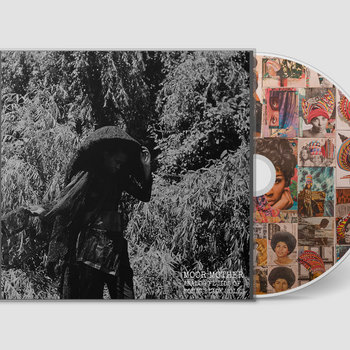
On her new album Analog Fluids of Sonic Black Holes, Philadelphia experimental artist and activist-poet Camae Ayewa—aka Moor Mother—continues the work she began on her raucous debut Fetish Bones: exploding the myth of America, and searching through the rubble to find the voices of the nation’s most disenfranchised people, and to reclaim and reassemble the black collective memory. “All we do is believe a myth,” Ayewa says. “My whole work is to fight against the erasure of black people, the erasure of poor people, the erasure of black women, the erasure of women.”
The songs on Analog Fluids have roots in the African-American vernacular tradition—slave narratives, oral histories, field hollers, and sorrow songs that have been left out of conventional history books. All of them are defined by the repeated message of tenacity and hope. “We always knew how to bring upon joy,” she says. “It’s what happens when joy is co-opted from us. We have always been very inventive and strong, and this strength allows us to continue and dig deep, and to read about those that came before us and preserve what’s powerful.”









Vinyl LP, Compact Disc (CD), T-Shirt/Apparel




These methods of coping with oppression, rooted in black folk culture, have found their way into contemporary music for generations. Ayewa references the “sonic healing” in the music of Alice Coltrane and Sun-Ra, saying, “There are so many inventive ways to persevere.” On “The Myth Hold Weight,” Ayewa recontextualizes the anthem “America, the Beautiful,” setting it over murky atmospherics and reciting, “From sea to sea to shining sea/ Oh say can you/ Put some more land on the menu/ You don’t let death compliment you/ No matter how ugly you feel.”
But while the record has an undercurrent of pained resilience, Ayewa herself is cautiously optimistic. “I don’t know if there’s a ‘safe space’ in this world,” she says. “We learn to create and hack our own ways of safety and comfort. You can see that from some of the liberation technologies that we present to the world.” Escape from an unjust system can be found in the notes of jazz and blues, music that evolved from work songs and spirituals to provide the sonorous accompaniment to decades of struggle.
Ayewa peppers samples of archival material throughout the album, from the sound of a man crooning “I’m comin’ home,” on “After Images” to the ‘“I can feel you’”s skipping across ‘Sonic Black holes.’ Poring over these old recordings, is another way for Ayewa to reclaim a devalued heritage. “It’s been systematic warfare against histories and language and land and people,” she says. “I have to uncover everything. It’s the work. If we don’t, we disconnect from the connection we have with the past and the future.” On Analog Fluids especially, she unearths relics of inherited trauma, and examines the butterfly effect across time. “All we are, are connections to everything,” Ayewa says. “Our actions create waves.”
This idea of history as a chain reaction is especially pronounced on “LA92,” where her formidable growl tears through the whirring synths: “Latasha got shot over orange juice,” she says, “No cash, got shot/ No justice body rock.” The lyrics refer to the murder of 15-year-old Latasha Harlins by Korean-born liquor store owner Soon Ja Du, who had accused her of shoplifting. The event, along with the videotaped beating of Rodney King two weeks prior, became the impetus for the Los Angeles race riots. “If you have the knowledge of what’s happening in the world, and what has happened in the world to marginalized people, then what will you do with your energy?” Ayewa asks. “How do you reflect energy? How can you even believe that you can affect things? There are all these questions that still need to be evaluated, because that’s not one isolated story.”







Vinyl LP, Compact Disc (CD), T-Shirt/Apparel




And while Ayewa’s counterattack on America’s exclusionary narrative runs throughout Analog Fluids, at the album’s end, she briefly softens the blow. “Passing of Time,” feels like slipping into a cool bath, Ayewa adapting her voice to suit the song’s staticky warmth. But it isn’t long before tender wounds start to sting: “My mama, my grandmama, my great-great-great grandmama/ picked so much cotton they saved the world/ all by themselves,” she recites over loose drums, a soprano vocal murmuring in the background. The song traces how slavery and oppression laid the foundation for the U.S. economy, and draws musically on the legacy of Nina Simone and Gil Scott Heron, suffusing expressions of grief with beauty and imagination. Compared to the rest of Analog Fluids, “Passing of Time” feels almost placid. Which is not to say the message lacks power; in fact, its gentle pathos and earnest message continues to haunt long after the album is finished.
If there is one thing Analog Fluids makes clear, it is that there are seemingly endless skeletons to be excavated. In spite of it all, Ayewa remains optimistic. “We are not heading towards a doomsday,” she insists. There is no clear cut path to deliverance, but, in the process of peeling back the layers, of dispatching her liberation technologies, and of retelling these lost narratives, Moor Mother uncovers the miracle of survival.







